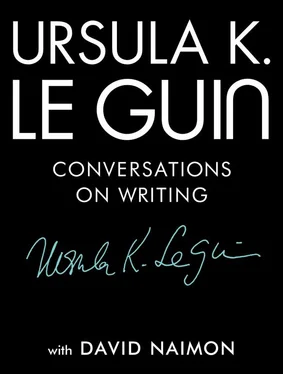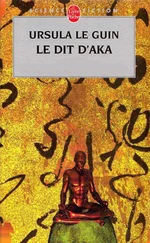UKL:I fear for Grace’s reputation, because it happens so often that a woman writer, very much admired but not best-seller famous, however admired by many critics, just slides out of sight after her death… and the place is filled by a man. Well, no man could possibly fill Grace Paley’s place. She wrote extraordinarily as a woman. And that may be part of the problem.
DN:When I interviewed Jo Walton we engaged this question as well. She said it is often difficult in any given moment or instance to know whether sexism is happening but if you step back and look at the way the canon is being formed—in this case we were talking about the canon in science fiction and fantasy—it becomes clearer. She brought up the example of William Gibson. Neuromancer won the Hugo and many other awards and around the same time C. J. Cherryh also won the Hugo and seemed to be informing the conversation at large, like Gibson. She went on to win the Hugo again six or seven years later, and seemed to be just as successful. But now, years later you look back and Gibson is in the canon and there are a lot of people who have never even heard of C. J. Cherryh.
UKL:That’s true. Why hasn’t she been reprinted? Why isn’t she talked about? There’s something slightly mysterious about this. What is misogyny? A male need to establish a male world? But it is a mystery—I can’t take it any further.
DN:You’ve been an outspoken critic of the increasing commodification of authors and how sales departments are taking over from editorial. That a lot of the choices that influence how a book is being shaped are less about art and more about commerce. You’ve pushed back against this, and argued that literature shouldn’t just be viewed in terms of what’s in vogue. It doesn’t seem like you’re against what is in vogue, but you’ve tried to expand the conversation beyond popular contemporary choices in stories and novels, like present tense and very short sentences.
UKL:There are advantages and disadvantages to living a very long time, as I have. One of the advantages is that you can’t help having a long view. You’ve seen it come and seen it go. Something that’s being announced as the absolute only way to write, you recognize as a fashion, a fad, trendy—the way to write right now if you want to sell right now to a right now editor. But there’s also the long run to consider. Nothing’s deader than last year’s trend.
DN:Can you discuss the cost/benefit trade-off when choosing past or present tense? You’ve talked before about how past tense allows for more ready movement back and forth in time, that it more closely mimics the ways our minds and memories work.
UKL:And it is particularly connected to telling a big story, a story with some real depth. But it is a complicated issue. Obviously the present tense has certain uses that it’s wonderfully suited for. But recently it has been adopted blindly, as the only way to tell a story—often by young writers who haven’t read very much. Well, it’s a good way to tell some stories, not a good way to tell others. It’s inherently limiting. I call it “flashlight focus.” You see a spot ahead of you and it is dark all around it. That’s great for high suspense, high drama, cut-to-the-chase writing. But if you want to tell a big, long story, like the books of Elena Ferrante, or Jane Smiley’s The Last Hundred Years trilogy, which moves year by year from 1920 to 2020—the present tense would cripple those books. To assume that the present tense is literally “now” and the past tense literally remote in time is extremely naïve.
DN:I would definitely encourage writers to look at your book reviews to see your thoughts on craft in context, in direct engagement with a specific piece of art. For instance, in your review of David Mitchell’s The Bone Clocks for the Guardian you discuss this issue of present tense. It’s a great review. You compare Virginia Woolf’s stream of consciousness to what you call Mitchell’s “stream of self-consciousness.” And you also bring up some of these issues around time. Here is what you said:
Here, in a novel deeply concerned with Time, there is virtually no past tense. Present-tense narration is now taken for granted by many fiction readers because everything they read, from internet news to texting, is in the present tense, but at this great length it can be hard going. Past-tense narration easily implies previous times and extends into the misty reaches of the subjunctive, the conditional, the future; but the pretense of a continuous eyewitness account admits little relativity of times, little connection between events. The present tense is a narrowbeam flashlight in the dark, limiting the view to the next step—now, now, now. No past, no future. The world of the infant, of the animal, perhaps of the immortal.
That seems so wonderfully put.
UKL:Good. [Laughs.] David Mitchell is a writer worth writing about.
DN:Let’s talk about point of view. The choice of first-person point of view is more popular today than ever. You’ve talked about how first person was mainly found in medieval diaries and saints’ confessions and then in Montaigne’s essays, and was not a big part of our literature until recently.
UKL:Third-person limited is very similar to first person in that it is one point of view only. One or the other of those two do seem to be, over and over, the only point of view used in contemporary fiction.
DN:But it is actually pretty late in the history of literature that both these points of view arise.
UKL:Henry James did the limited third person really well, showing us the way to do it. He milked that cow successfully. And it’s a great cow, it still gives lots of milk. But if you read only contemporary stuff, always third-person limited, you don’t realize that point of view in a story is very important and can be very movable. It’s here where I suggest that people read books like Woolf’s To the Lighthouse to see what she does by moving from mind to mind. Or Tolstoy’s War and Peace for goodness’ sake. Wow. The way he slides from one point of view to another without you knowing that you’ve changed point of view—he does it so gracefully. You know where you are, whose eyes you are seeing through, but you don’t have the sense of being jerked from place to place. That’s mastery of a craft.
DN:And you put forth that the omniscient point of view is a legitimate choice for contemporary writing.
UKL:Any of us who grew up reading eighteenth- or nineteenth-century fiction are perfectly at home with what is called “omniscience.” I myself call it “authorial” point of view because the term “omnisicence,” the idea of an author being omniscient, is so often used in a judgmental way, as if it were a bad thing. But the author after all is the author of all these characters, the maker, the inventor of them. In fact all the characters are the author if you come right down to the honest truth of it. So the author has the perfect right to know what they’re thinking. If the author doesn’t tell you what they are thinking… why? This is worth thinking about. Often it’s simply to spin out suspense by not telling you what the author knows. Well, that’s legitimate. This is art. But I’m trying to get people to think about their choices here, because there are so many beautiful choices that are going unused. In a way, first person and limited third are the easiest ones, the least interesting.
Читать дальше









